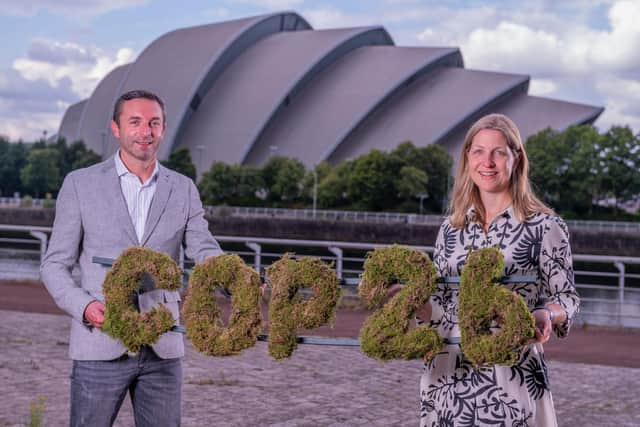Royal Bank of Scotland post-COP26 podcast
In the latest episode of podcast series A Greener World Needs A Plan, fashion pioneer Dr Antoinette Fionda-Douglas says the event could be a real catalyst for change.
The founder of Beira, which buys discarded materials from the luxury fashion industry and produces limited edition and long-lasting womenswear, says: “For me, COP26 was fantastic and I know many other businesses were really inspired by it.
“It was brilliant to see fantastic green companies there learning from each other - speaking to like-minded sustainable businesses that are pushing the boundaries and making a difference. I think that's the biggest legacy from COP26.”


Martin Valenti, Director for NetZero at South of Scotland Enterprise, says: “Through those two weeks, it was business after business after business, 90% of them SMEs, saying ‘I'm all over this agenda’.”
However, there were warnings that there is still a long way to go - but that action is needed now.
Darren Pirie, Royal Bank of Scotland’s Enterprise & Climate Propositions & Engagement Lead, says: “I think [COP26] was a really good focal point to bring it all together and I'm very proud of the role the bank played. It's just the starting point, though.”
Martin Valenti stresses that action must be taken now, not some unspecified point in the future: “I can't stress enough to businesses: Don’t kick this into the long grass. The important thing, for banks and others, is to convince people tomorrow is today. Net zero and the just transition aren’t soundbites; these are real business opportunities.”
To support small businesses to become greener, the Royal Bank, part of NatWest Group, launched new green loans and green asset finance in February.
The new financial products help fund green activities or green assets, Darren Pirie explains: “There is appetite in the marketplace for something that helps our customers highlight their commitment to the green agenda.
“Examples could be simple things like solar panels, an electric vehicle, or retrofitting an old building to improve its energy efficiency. Businesses are looking to make those changes [as] demonstrable examples of where they're making their business greener and living up to the net zero ambition. Our loans support those types of activities.”
Mr Pirie says this is part of a wider package of support for small businesses, starting with tools to help them understand their environmental impact: “At that point, we look at how we help our customers understand the action plan - what are the 2, 3, 10 key things they could do to transition to a better place on their emissions or environmental impact?”
Antoinette Fionda-Douglas welcomes the green loans, saying: “Smaller, sustainable businesses do need help. We're trying to do things differently and often, we're working against the status quo. That little extra help can make the difference.”
However, she worries the public is still uncertain just what sustainability means: “65% of people are saying ‘Yeah, we want to be more sustainable’. But I don't really think people know what sustainable is. I think there's a lack of general education about what that means in terms of the fashion industry, and a lot of greenwashing.
“We're used to really cheap, unsustainable prices for fashion products. And it's wrong - somebody somewhere is paying for that. There's 100-150 billion new garments made every year, and most of that is going to waste, in landfills. It's unsustainable in so many ways.”
Ms Fionda-Douglas says businesses have to act - and stresses that greener can be cheaper: “Small businesses sometimes think being sustainable is more expensive, but for us, it definitely hasn't been. We've sought the most sustainable solution to every decision we make and 8 times out of 10, that’s been the cheaper option.”
Martin Valenti agrees: “When you get into discussions with small businesses, it’s about saving energy, saving money. It's about not wasting resources, and about deploying new ideas.”
Mr Valenti says COP26 helped make people realise that it’s not all about either-or choices.
“Part of the legacy for COP26 is an awakening,” he explains. “We had 25 COPS before and 24 failed because we said you can have an economic outcome or an environmental one, but you can't have both. But we know that you can have your cake and eat it in Scotland.
“Our mindset is ‘Hope mobilises, fear paralyses’. We will not be fearful of climate change. We will be respectful of the challenge, but we'll be relentless in our pursuit to find solutions. If you get a narrative like that, people say ‘Count me in’.”
And Mr Valenti thinks a generational shift means we will stay firmly on the green path: “Younger people are far more savvy in this space,more hungry to see action. People used to say, ‘Somebody should do something about climate change’. What I’m hearing now is young people going, ‘Yeah, me. I'm going to do something about climate change and you're going to get out of my way’. I like that attitude - the young breed coming through saying you guys have taken it as far as you can - we’ve got more ideas and we’re not as scared to take the big risks.”
Darren Pirie says real success for the Royal Bank’s green approach would be if it delivers tangible benefits for customers: “We start to look at how we increase the range of financing solutions we can offer, and harness data to provide tailored, personalised support for customers. When that starts to happen holistically across all activities, that's when you can start calling it success.”
You can listen to the podcast here.
You can listen to the podcast here.